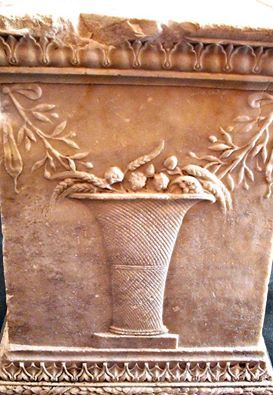#demeter sacrifices
Ἑβδόμη Μεσοῦντος/ Ἑβδóμη ἐπὶ δέκα / Ἑπτακαιδεκάτη, XVII day
From today’s sunset: seventeenth day of Boedromion.
‘Hiereia Deuro- Hither the victims’
The day of the Mysteries on which the Archon Basileus and the epimeletai offer the community sacrifices to the Two Goddesses at the Eleusinion in the City; at all these sacrifices the theoroi of foreign states, who have sent the aparchai, seem to have taken part.
Private sacrifices to Demeter and Kore: “To Demeter and Kore perfect female pigs”.
About the sacrifices and aparchai: “…to the Two Goddesses shall be offered the first fruits of the earth, according to the traditions of the homeland and the Oracle of Delphi to the Athenians…the Hierophant and the Dadouchos impose that the Hellenes offer, in occasion of the Mysteries, the first fruits of the earth, according to the traditions of the homeland and the Oracle of Delphi to the Athenians…to be offered in sacrifice the pelanos, as indicated by the Eumolpidai, a trittoa boarchos (triple sacrifice beginning with a bovid) with gold-plated horns for each one of the Two Goddesses, barley and wheat for Triptolemos and the God and for the Goddess and for Eubulos a perfect victim for each one of Them, and for Athena an ox with gold-plated horns; the hieropoioi and the assembly have to consacrate as votive offerings the rest of the offered barley and wheat…from this may come many good things and fertility and plenty for those who are not found guilty against the Athenians, Athens and the Two Goddesses.”
(see IG II2 76; 1367; Lys. Andoc. 4; Eur. Suppl. 173)
***
“Throw out Demeter’s holy grain upon the well-rolled threshing floor on the seventh of the mid-month. Let the woodman cut beams for house building and plenty of ships’ timbers, such as are suitable for ships.” The scholia add: “If, as Orpheus says, the seventeenth day is dedicated to Ate, and therefore it is suitable for cutting the wood and for stripping the fruit from its coverings, also Hesiod, not without love for Muses, consecrated the day to these works.”
Erga, 805-808
(Marble Altar with symbols of Demeter. End 1st century BCE-beginning 1st century CE- from “Palazzo a mare” at Capri - Capri, Certosa di San Giacomo, now at exhibition “Augustus and Campania” at Archaeological Museum of Naples, until May 4, 2015)
Post link

